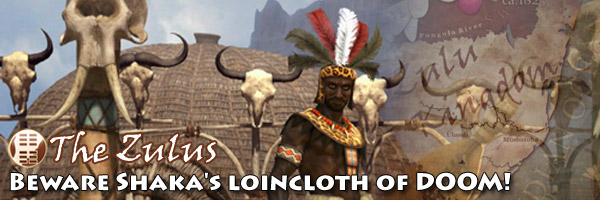
Rounding out my series of strategy posts about Brave New World's new civilizations, here is the Zulu. But first, I want to take a moment to thank the readers and everyone who has provided feedback and constructive criticism for these posts. When I first started with Assyria, I wasn't sure if I'd bother doing any other civs at all - let alone all of them! But people read the posts and encouraged me to keep writing them, and now they are among the most popular posts on this blog! I have been very humbled and gratified with the responses that I have received. I'd like to specifically thank all of those who posted suggestions and feedback on the forums. I really appreciate your participation. Many of your ideas and strategy alternatives have been incorporated into revisions of these posts, and I've taken your criticisms to heart in writing the subsequent posts. I'd also like to thank the fine folks at PolyCast, who have taken the time to discuss and publicize these posts, as well as provide additional feedback. Keep up the good work!
As for my future plans: I expect to take some time away from Civ to catch up on some other games, like Dark Souls II and some Steam games that I've had sitting on my computer for a while (like Europa Universalis IV). I also intend to get back into modding and some other personal projects. This does not mean that I am completely done with Civ V strategies though. I do intend to look at some of the civs whose strategies were significantly changed by the Brave New World expansion (particularly France and Arabia, whose uniques were redesigned). I will continue to write strategies as time permits, and will continue to check the forums and comments and possibly update these posts if readers provide new insights. Thanks again, and keep on Civin'!.
Now, without further ado, the Zulu!
Little is known about the regions of southern Africa prior to European invasions and colonization. The region was divided up into small tribes and kingdoms, but they kept very few written records of their histories. In the early 19th century, the Zulu Kingdom (lead by Chief Shaka) came to dominate large chunks of the eastern coast of southern Africa. Shaka's successors expanded the kingdom through wars with rival tribes and European settlers for almost a century before the British offered an ultimatum in 1878 to King Cetshwayo regarding a territory dispute between the Zulu and the Boers (Dutch settlers in Africa). Cetshwayo rejected the terms of the ultimatum, leading to the Anglo-Zulu war. The Zulu won an early victory, overwhelming the British with their tactics and sheer numbers, handing the British their single worst defeat to a native African fighting force. In the long-term, however, the Zulu were incapable of standing up to the British army that was equipped with firearms. The British sieged the Zulu capital, Ulundi, exiled King Cetshwayo to Cape Town, and divided the Zulu Empire into 13 "kinglets". This lead to internal conflict between the kinglets, forcing the British to reinstate Cetshwayo as the King of the Zulu. But conflict continued, and Ulundi was again sieged by one of the kinglets and Cetshwayo was killed. When the Union of South Africa was formed, the Zulu Kingdom stopped being recognized as a sovereign power, although several Zulu kings did retain significant influence in the region through the middle of the 20th century.
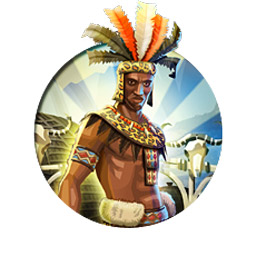
Shaka kaSenzangakhona was the first King of the Zulu Empire. He united several small tribes and then initiated significant military, spiritual, and cultural reforms. He used innovative and highly-aggressive military tactics to conquer neighboring tribes and establish the Zulu Kingdom as a dominant force in the southern Africa region. He was a brutal and efficient leader and introduced the iklwa stabbing spear and large cowhide shields that allowed his soldiers to quickly surround their enemies and engage in visceral close-quarters combat. His impi soldiers employed a novel "bull horn" formation consisting of three parts:
- the "chest" was the main force composed of senior soldiers who would engage the enemy to keep them pinned and immobile,
- the "horns" were squads of young, fast warriors who would flank the enemy that was engaged with the chest,
- and the "loins" were a reserve force behind the chest and with their backs to the battle who would defend the army from flanking maneuvers and chase down escaping enemies.
These tactics proved incredibly useful to Shaka and to his successors (even against the muskets of European invaders), and it was even used to crush the British in the opening battle of the Anglo-Zulu war. However, these tactics could not survive against the killing efficiency of more advanced firearms and cannons and were eventually abandoned. [More]
6c911954-01d0-47d1-9bc6-d03b1185221c|9|5.0
Tags:Sid Meier's Civilization, Civilization V: Brave New World, Civilization V, Zulu, Shaka, Iklwa, Ikanda, Impi, spear throw, unit maintenance, war, warmonger, promotion, buffalo, buffalo horns, buffalo chest, buffalo loins, melee, flanking, Africa, barracks, pikeman, Civ-V
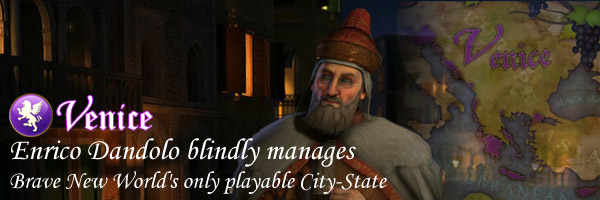
The penultimate entry in my series of strategy posts about Brave New World's new civilizations will focus on the very unique civilization of Venice: the playable City-State.
The city of Venice is one of the most architecturally astounding cities in the world. It is built on top of 118 small islands in the marshy Venetian lagoon. These natural and artificial islands are separated by a network of canals that run through the city and act almost like a network of roads. Many of the buildings and paved surface roads and walkways are built on top of stilts that emerge from these shallow canals and the city contains over 400 bridges. Historically, most of Venice's traffic has been through the waterways (via gondole) or on foot, but the modern city does have a contemporary road network (although a very compact one) intended for automobiles. Due to its unique environment and construction, the city is an astounding work of engineering art in and of itself.
There are no surviving historical records depicting the founding of Venice, but historians believe that the islands were originally settled by refugees from Roman cities during the Germanic and Hunnic invasions between 400 and 600 C.E. Venice began to expand its international influence prior to the thirteenth century by battling pirates that were plaguing trade in the Adriatic and Mediterranean. The city-state began to become an influential economic force in the region due to its position as a hub for trade between Europe and the Middle East, and Venice non-violently acquired control over many islands of the Aegean, including Cyprus and Crete. Failed military actions and the devastation of the black plague in the fifteenth century lead to the decline of the Venetian empire, and Venice was eventually conquered by Napoleon, then surrendered to Austria in the terms of a peace treaty, then conquered again by Italy during its war of independence. Fortunately, Venice was spared from attack during World War II, and so much of its historical architecture has remained intact, making it a popular tourist destination today.
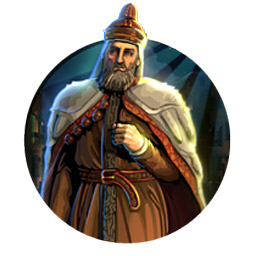
The 42nd Doge of Venice, Enrico Dandolo is known mostly for his blindness. There are conflicting stories regarding how Dandolo became blind. The decreasing legibility of his signature between 1174 and 1176 implies that he became blind gradually, possibly due to an injury sustained in Constantinople. He was also a very pious leader who provided invaluable assistance to the knights of the Fourth Crusade and played an integral part in the eventual sacking of Constantinople. Despite his blindness, Dandolo survived into extreme old age, being almost a hundred years old (by some estimates) at the time of his death in 1205. He was buried in the Hagia Sophia in Constantinople, but his original tomb was destroyed by the Ottomans when they captured Constantinople (renamed it Istanbul) and converted the Hagia Sophia into a mosque.
Venice was a City-State in Gods & Kings but was promoted to a full civilization for Brave New World. Venice doesn't expand like a traditional civ in Brave New World; instead, it buys control of fellow City-States or expands its influence via conquest, both of which are funded by its excessive trade routes. [More]
68d21b21-5812-4863-90c6-b12e9b6ac21b|13|4.9
Tags:Sid Meier's Civilization, Civilization V: Brave New World, Civilization V, Venice, Enrico Dandolo, Serenissima, Merchant of Venice, Great Galleass, trade, trade route, caravan, cargo ship, navy, puppet, warmonger, gold, commerce, Great Merchant, galleass, city state, capital, Civ-V
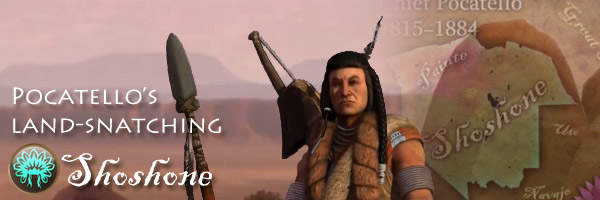
Only a few more civs to go in my series of strategy posts about Brave New World's new civilizations. Next up is the land-snatching Shoshone lead by Chief Pocatello.
The Shoshone are a group of native Americans that originated in the rocky regions of western North America (now Nevada and Utah). Around the same time as European colonists began settling on the east coast, the Shoshone began expanding eastward, which brought them into conflict with other plains indians such as the Blackfoot, Crow, Lakota, Cheyenne, and Arapaho. Some Shoshone who migrated into Texas and Oklahoma would break off into their own tribe: Comanche, who would become expert horsemen. The Shoshone began to come into conflict with the United States in the late nineteenth century due to the U.S.'s westward expansion, leading to a massacre of as many as 500 Shoshone at a winter encampment at Bear River in 1863. Shoshone culture has survived on reservations to this day, and in 2008, began working with Utah and Idaho state leaders to create a memorial to the Bear River Massacre. At its height, the Shoshone nation was composed of many tribes that occupied vast territory, extending from modern-day Montana all the way through Nevada; and their offshoot tribe, the Comanche, exhibited strong control of Texas and Oklahoma.
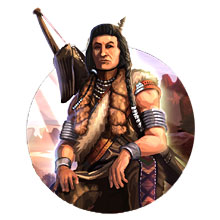
As westward immigration lead to conflict between the Shoshone and United States, Chief Pocatello (or, Tondzaosha) lead his tribe in raids and attacks against settlers in Idaho along the Oregon trail. He was feared and respected by his enemies, and Brigham Young (leader of the Mormons) attempted to offer terms of appeasement to the Shoshone in order to stop the attacks. Instead, the United States army arrived and destroyed any chances of a peaceful solution. Despite the overwhelming might of the U.S. army, Pocatello avoided the total massacre of his people and eventually negotiated the Fort Bridger Treaty of 1868, which granted the Shoshone a permanent reservation at Fort Hall near the Snake River in exchange for annual compensation from the United States (which the United States rarely honored in full). Due to this agreement, the Shoshone cultural identity survives to this day, and the city of Pocatello in Idaho is named in his honor. [More]
b4ea0d42-ce12-454e-8d39-78be32d2a953|8|4.9
Tags:Sid Meier's Civilization, Civilization V: Brave New World, Civilization V, Shoshone, Pocatello, Pathfinder, Comanche, Comanche Rider, Great Expanse, horses, exploration, scout, ancient ruins, native tongue, cavalry, Pride of the Ancestors, goody huts, tile acquisition, Civ-V, unique recon unit, unique mounted unit, unique unit
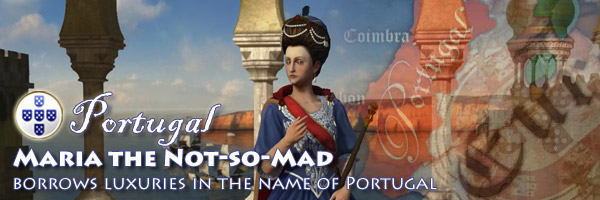
Going into the back-end of the new civilizations presented in Brave New World, here is another strategy posts. This time, I'll be discussing the gold-generating machine that is Portugal.
The Portuguese essentially initiated the European "Age of Discovery" through the efforts and patronage of Henry the Navigator. After exploring Atlantic islands, Africa, and South America, Portugal established the first world empire in Europe and became one of the wealthiest and most influential powers of the era. Portugal lost much of its imperial strength due to wars with Napoleon and after its most significant colony, Brazil, declared independence. Portugal would never regain its former glory, but it still maintained control over many trading colonies up through the nineteenth century through the use of Feitoria (fortified factory complexes) in its colonies, which are represented in Civ V as city states.
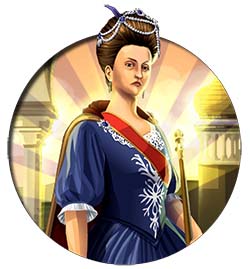
Maria I was the first undisputed queen regnant of Portugal and was crowned in 1777. Her rule was tarnished by mental instability and dementia that was first noticed in 1786 and which had made her incapable of managing affairs of state by 1792. The following decade, wars broke out with Spain and Napoleonic France, and Maria (along with the entire royal court) was moved to the colony of Brazil. Despite her madness, she is well-regarded among both Portuguese and Brazilian historians for her domestic policies and for supporting Brazilian independence. she is known as "Maria the Pious" in Portugal, and "Maria the Mad" in Brazil due to the fact that her mental state had already deteriorated by the time she had been relocated to Brazil, and her son had to perform most duties of state. [More]
655c6ad7-9fae-42c8-95b9-68b5c7d0e6d4|4|5.0
Tags:Sid Meier's Civilization, Civilization V: Brave New World, Civilization V, Portugal, Maria I, Nau, carrack, caravel, navy, Feitoria, factory, fort, closed sea, commerce, luxury resource, resource diversity, gold, trade, trade route, caravan, cargo ship, unique improvement, Exotic Cargo, Mare Clausum, city state, Civ-V
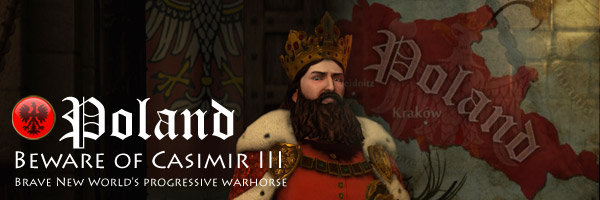
Halfway through my series of strategy posts about Brave New World's new civilizations, we have Poland.
Poland is a Slavic nation in Central Europe that can trace its origins to the 10th century AD, when Mieszko I united the pagan tribes that were ruled by his ancestors and was crowned the first King of the Polans. He was baptized during his reign and the young Polish kingdom quickly became part of the Catholic sphere of influence. During the late Middle Ages, the rulers of Poland began putting increasing focus on educational and social reforms, and Poland became one of the best-educated nations in all of Europe, which may have contributed to it becoming a popular destination for immigrants - particularly Germans, Jews, and Armenians. The high level of education may have also helped protect the Polish population from the effects of the plague, as Poland had one of the lowest mortality rates of any European nation during the time of the Black Death. The combination of large numbers of immigrants and the popularity of Protestantism during the Reformation helped Poland to become a very tolerant culture. Its central location in Europe made Poland a subject to many wars, particularly with Germany, Prussia, and Russian. The nation was occupied by Nazi Germany during World War II, and was firmly within the Iron Curtain during the Cold War, but eventually returned to a democratic style of governance based on a market economy after the fall of the Soviet Union.
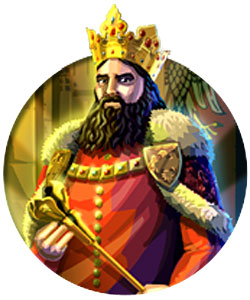
Casimir III was the last King of Poland from the Piast (founding) Dynasty, and is widely regarded as the nation's greatest leader. He inherited a nation that was crumbling due to a war-blasted economy, and the legitimacy of his claim to the throne was questioned by his political rivals. In order to gain the favor of the landed elites, he reformed Polish law to grant special privileges to the higher castes; and he gained the favor of Jewish immigrants by granting them unprecedented protections under the law that allowed them to maintain their religious and cultural identities during a time in which other European Jews were being forced to convert to Christianity. During his reign, he founded Poland's first major university, and promoted an educated society. Casimir remarried several times, and since all of the children from his first and fourth (final) marriage were daughters, he left no lawful heirs; thus, he named one of his nephews to be his heir. By the end of his reign, Poland had doubled in size and had a flourishing economy and growing educated classes.
Led by the bearded and intimidating Casimir III, Poland was an immediately attractive Brave New World civilization due to Solidarity. Free social policies you say? Yes, please! Give me those policies so that I may conquer the world! Poland is Chichian's favorite civ in the expansion (and maybe the whole game) due to her fondness of social policies. I can't really argue against her. [More]
93f1cb37-b3dd-48af-99d0-c48378b750e3|15|4.3
Tags:Sid Meier's Civilization, Civilization V: Brave New World, Civilization V, Poland, Casimir III, Winged Hussar, hussar, Solidarity, social policies, pastures, horses, mounted warfare, lancer, stable, Heavy Charge, Ducal Stable, Civ-V
|

| 12 | | | | | | | 60 | | 11 | | | | | | | 55 | | 10 | | | | | | | 50 | | 09 | | | | | | | 45 | | 08 | | | | | | | 40 | | 07 | | | | | | | 35 | | 06 | | | | | | | 30 | | 05 | | | | | | | 25 | | 04 | | | | | | | 20 | | 03 | | | | | | | 15 | | 02 | | | | | | | 10 | | 01 | | | | | | | 05 |
|